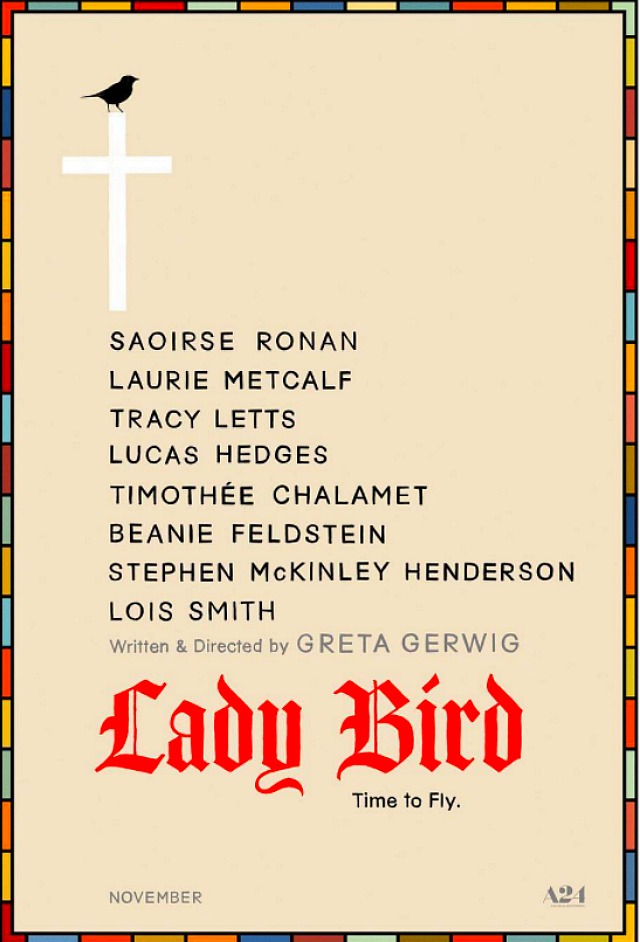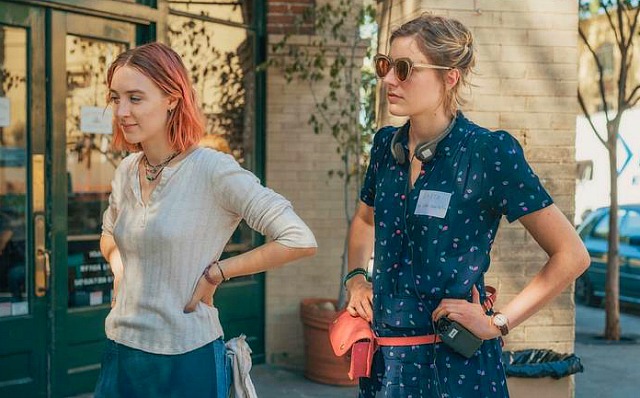Greta Gerwig‘s Lady Bird (A24, 11.10), which I finally saw last night after absorbing all the buzz and praise for the previous two days, is by far the pizazziest, wisest, smartest, most emotionally resonant and complete film I’ve seen at Telluride ’17. And it’s going to keep happening after it opens two months hence, and by this I mean it will stir the award-season pot.
Lady Bird vibrates with pluck, wit and smartypants energy, but it’s not some indie outlier that will peak in terms of awards recognition with a Spirit trophy or two. It’s a Best Picture contender if I ever saw one, and Saoirse Ronan‘s lead performance — essentially a portrayal of the young, Sacramento-imprisoned Gerwig at age 18 or thereabouts — is a locked-down Best Actress contender.

Lady Bird star Saoirse Ronan, director-writer Greta Gerwig during filming in Sacramento.
A comically anguished piece of self-portraiture in which the 34 year-old Gerwig recalls and reconstructs (and to some extent re-invents) her life in ’02, when she was finishing high school and dying to get the hell out of Sacramento, Lady Bird is the only serious Telluride break-out, the only film that has really cast one of those spells…an amusing, touching, smallish knockout that truly glistens and scores and pushes that special massage button.
Lady Bird is Rushmore’s Daughter — a whipsmart, girl-centric indie that deals emotionally rounded cards, a Wes Anderson-type deal (sharply disciplined, nicely stylized, just-right music tracks, grainy film-like textures) but without the twee, and with polish and English and all kinds of exacting, soulful self-exposure from director-writer Gerwig.
She’s passing along a half-funny, half-turbulent saga of high-school-senior angst, lust, parental friction, friendship, frustration, existential ambition and social longing.
Ronan’s performance is the take-home, for sure — a pushy, achey and vulnerable teen thing, almost but not quite in the Max Fischer-Jason Schwartzman mode. She’s also, of course, portraying the young Gerwig. You could say that Ronan is inhabiting Gerwig as much as Jesse Eisenberg played a generic Woody Allen-like figure in Cafe Society, only with more energy. In my book this is Ronan’s best performance yet, and that ain’t hay.
But Laurie Metcalf, as Ronan’s prickly and emotionally frustrated mom, is a stand-out also, and a likely contender for Best Supporting Actress.
Engaging supporting performances are also given by Lucas Hedges (Manchester By The Sea), currently-reigning-hearthrob Timothee Chalamet, Beanie Feldstein, Stephen McKinley Henderson and 86 year-old Lois Smith.
I don’t recount plot beats in my reviews so go elsewhere for that.
The general consensus since Friday has been that Guillermo del Toro‘s The Shape of Water was the best of the Telluride bunch. I’m sorry but no, or at least not by my standards. Lady Bird, as richly attuned to its own vision of universal symmetry and poignancy as Shape, is better, I feel, because I prefer reflections and re-packagings of real, actual life, and Lady Bird is certainly that, casting a special light upon a kind of tough, late-teen situation that we’ve all known and grappled with.
My other two Telluride favorites, Andrey Zvyagintsev‘s Loveless and Paul Schrader‘s First Reformed, are audacious, drill-down provocations of the highest art-film order, but Lady Bird is just as prickly-brilliant and ambitious and shoot-for-the-moon as these, and more successful in terms of reaching out and finding the right kind of audience-friendly voice, and then touching down in that communal sweet spot that we all cherish — who we were, how we got out of that, what mattered then and who we are now.
I’m astonished that Awards Daily‘s Sasha Stone has described Ronan’s character (self-named Lady Bird with a given name of Christine) as “perhaps [a] somewhat unlikable teenage girl.” In this sense any headstrong and assertive high-school senior with hunger and ideas, lacking the social finesse that comes with maturity and experience, is “somewhat unlikable” — please! This is the same kind of pushback that Jason Schwartzman‘s Max received (why isn’t he more personable, more conventionally likable?) when Rushmore opened in late ’98.
Then again Stone does call Lady Bird “an impressive, challenging, buoyantly entertaining work — a movie that honestly chronicles a young woman’s strong-willed struggle to take charge of the aspirations in her head, the turbulence in her soul, and the irrepressible passion in her heart.”


